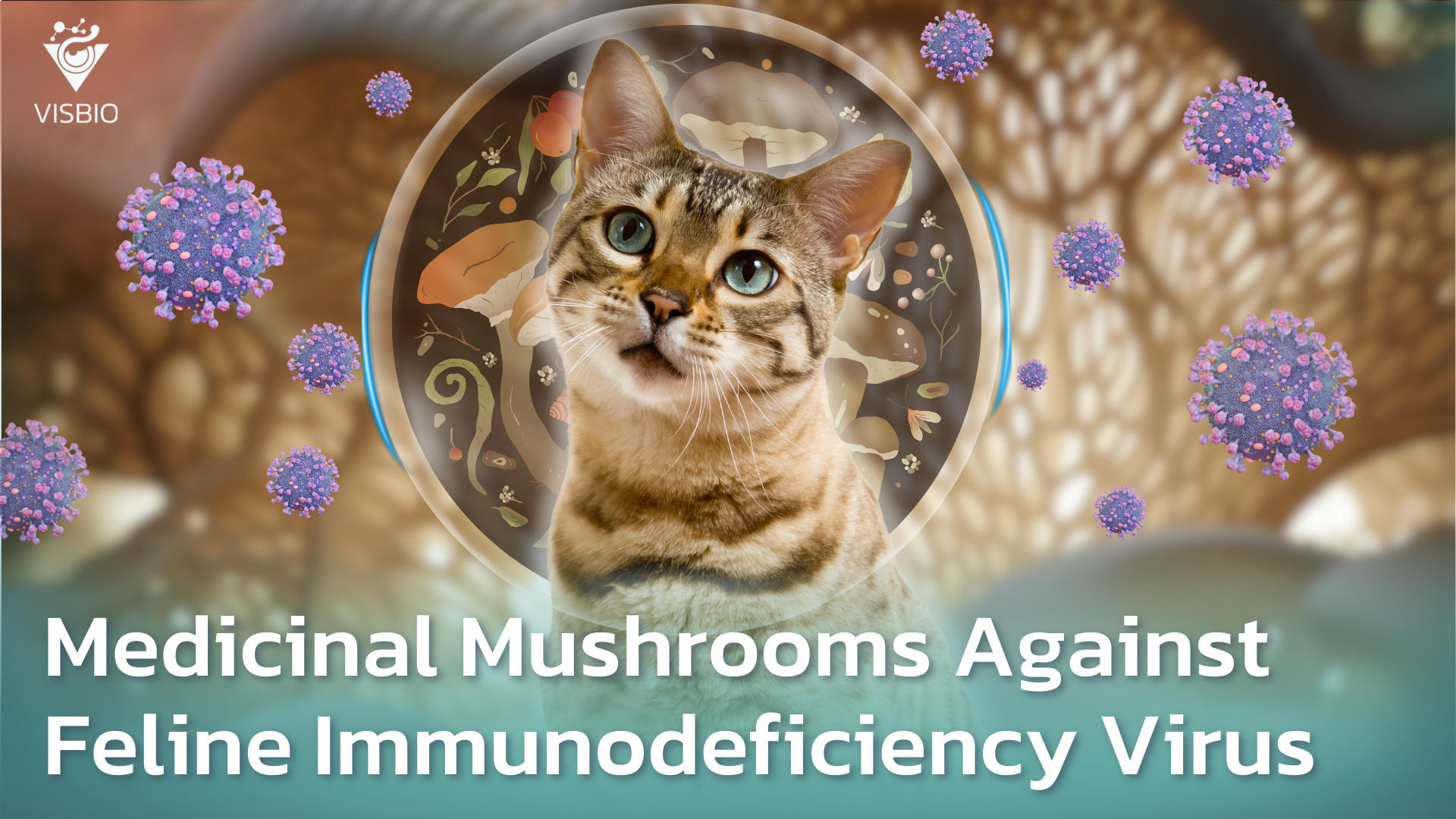The Growing Concern Over FIV in Cats
Feline immunodeficiency virus (FIV) poses a significant threat to the health of domestic and wild cats, causing symptoms akin to AIDS in humans. Cats infected with FIV suffer from weakened immune systems, leaving them vulnerable to various opportunistic diseases, including infections, cancers, and neurological disorders. The standard treatment for FIV relies on medications developed for human HIV, but these treatments come with limitations such as side effects, high costs, and the risk of viral mutations. This highlights the urgent need for alternative therapies to combat FIV more effectively. Could medicinal mushrooms hold the key?
Medicinal Mushrooms: A Natural Solution?
In the search for natural antiviral agents, medicinal and edible mushrooms have emerged as a promising solution. Mushrooms are known for their bioactive compounds, which possess potent anticancer, immunomodulatory, and antiviral properties. In the study conducted by Dr. Kiattawee Choowongkomon and his team, 17 different mushroom species were tested for their ability to inhibit the reverse transcriptase (RT) enzyme, which plays a critical role in FIV replication. By inhibiting this enzyme, the virus’s ability to replicate and integrate into the host genome is blocked, reducing its spread within the infected cat’s body.
Study Findings: Which Mushrooms Show the Most Potential?
Among the 17 mushrooms tested, several species stood out for their strong anti-FIV properties, particularly Inonotus obliquus, Phellinus igniarius, Cordyceps sinensis, and Morchella esculenta. The study found that the ethanol extract from the dried fruiting bodies of Inonotus obliquus had the strongest inhibitory effect, with an IC50 value (the concentration required to inhibit 50% of RT activity) of 0.80 µg/mL. Similarly, extracts from Phellinus igniarius and Cordyceps sinensis also exhibited strong anti-FIV activities, making them potential candidates for developing alternative FIV treatments.
How Do Mushroom Extracts Inhibit FIV?
The ability of these mushroom extracts to inhibit FIV is primarily due to their rich content of bioactive compounds. For instance, Inonotus obliquus contains compounds like hispolon and protocatechuic acid, which have been shown to possess strong antiviral, antioxidant, and immune-modulating properties. These compounds work by interfering with viral enzymes or the initial stages of viral infection, preventing the virus from binding to host cells and replicating. This mechanism of action is similar to that of non-nucleoside reverse transcriptase inhibitors (NNRTIs), a class of drugs used to treat HIV in humans.
The Future of Mushroom-Based FIV Treatments

While the results of this study are promising, further research is needed to identify the specific components responsible for the anti-FIV effects and to explore how these extracts can be applied in real-world veterinary treatments. Combining mushroom extracts with existing FIV treatments could enhance the efficacy of current therapies, reduce drug resistance, and improve the overall health of infected cats. In addition to their antiviral properties, these mushrooms also provide nutritional and immunological benefits, making them a well-rounded option for supporting feline health.
What Does This Mean for Your Business?
For companies in the veterinary, pharmaceutical, and pet care sectors, this breakthrough offers a new opportunity to innovate within the market for FIV treatments. The rise in demand for natural, alternative therapies is becoming increasingly popular among consumers who prefer holistic approaches. Medicinal mushrooms, with their proven antiviral properties, could be developed into supplements or natural remedies that can complement existing FIV treatments or serve as preventive health measures.
Incorporating this research into your product offerings could distinguish your brand as an innovator in natural veterinary care. Businesses that invest early in mushroom-based FIV treatments can offer a unique solution that meets the needs of both veterinarians and pet owners seeking effective and natural alternatives to traditional drugs. By integrating this cutting-edge research, your company can build trust and leadership in the rapidly growing market for pet health solutions, ensuring a competitive edge in both local and global markets.
This is also an excellent opportunity to collaborate with research institutions like ours to develop proprietary blends, clinical studies, and patented products that can enhance your business portfolio. Whether you’re a large veterinary pharmaceutical firm or a niche pet care brand, tapping into the potential of medicinal mushrooms could be a game-changing move.
Explore Natural Solutions for FIV

As research continues to reveal the incredible potential of medicinal mushrooms, veterinarians and pet owners alike should consider natural alternatives in FIV management. For businesses in the veterinary pharmaceutical sector, the development of mushroom-based FIV treatments represents an untapped market with great potential. If you are interested in learning more about how your business can capitalize on this research, contact us for a free consultation. Together, we can explore innovative ways to improve feline health and wellness.
About the Author
 Associate Professor Dr. Kiattawee Choowongkomon is an expert in biochemistry, with a focus on proteins, biosensors, and natural extracts. Through research collaborations with leading institutions both in Thailand and internationally, Dr. Kiattawee’s research has had a lasting impact on both academic and commercial sectors. His collaborative work spans across leading institutions, contributing to innovations that are now being applied in fields ranging from healthcare to agriculture.
Associate Professor Dr. Kiattawee Choowongkomon is an expert in biochemistry, with a focus on proteins, biosensors, and natural extracts. Through research collaborations with leading institutions both in Thailand and internationally, Dr. Kiattawee’s research has had a lasting impact on both academic and commercial sectors. His collaborative work spans across leading institutions, contributing to innovations that are now being applied in fields ranging from healthcare to agriculture.
About the Research
This study focuses on the anti-FIV properties of medicinal and edible mushroom extracts, with an emphasis on their ability to inhibit the reverse transcriptase enzyme, a key component in the FIV replication process. The results demonstrate the potential of mushrooms like Inonotus obliquus and Phellinus igniarius as natural treatments for FIV. This research was published in Veterinary World with DOI: 10.14202/vetworld.2020.1798-1806.



